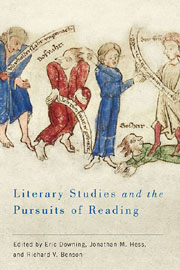Book contents
- Frontmatter
- Contents
- List of Illustrations
- Introduction
- Part I Medieval and Early Modern Practices of Reading
- Part II Reading, Secularization, and Transcendence in the Long Nineteenth Century
- 5 Reading and the Writing of German-Jewish History
- 6 Similia Similibus Curentur: Homeopathy and Its Magic Wand of Analogy
- 7 Reading and Rhetorical Generation: The Example of Blake's Thel
- 8 Sender Glatteis Reads Lessing and Comes to a Sad End: Some Thoughts on Karl Emil Franzos's Der Pojaz and the Problem of Jewish Reading
- Part III Theories and Practices of Reading in the Twentieth Century and Beyond
- Part IV Postscript: The Ends of Reading
- Works Cited
- Notes on the Contributors
- Index
8 - Sender Glatteis Reads Lessing and Comes to a Sad End: Some Thoughts on Karl Emil Franzos's Der Pojaz and the Problem of Jewish Reading
from Part II - Reading, Secularization, and Transcendence in the Long Nineteenth Century
Published online by Cambridge University Press: 05 February 2013
- Frontmatter
- Contents
- List of Illustrations
- Introduction
- Part I Medieval and Early Modern Practices of Reading
- Part II Reading, Secularization, and Transcendence in the Long Nineteenth Century
- 5 Reading and the Writing of German-Jewish History
- 6 Similia Similibus Curentur: Homeopathy and Its Magic Wand of Analogy
- 7 Reading and Rhetorical Generation: The Example of Blake's Thel
- 8 Sender Glatteis Reads Lessing and Comes to a Sad End: Some Thoughts on Karl Emil Franzos's Der Pojaz and the Problem of Jewish Reading
- Part III Theories and Practices of Reading in the Twentieth Century and Beyond
- Part IV Postscript: The Ends of Reading
- Works Cited
- Notes on the Contributors
- Index
Summary
Karl Emil Franzos's novel Der Pojaz (The clown of Barnow) was completed in 1893, but was published only posthumously, one year after his death in 1905 by his widow, Ottilie, who explained not what were the reasons for the delay, but what were not the reasons: that he had not revised it in the interim and that “er scheute nicht den Kampf mit den dunklen Mächten, die dies Buch vielleicht wieder gegen ihn aufgewühlt hätte” (DP, 7; Nor did he fear a renewal of the battle with the dark forces which this book might have provoked [CoB, xviii]). There has been some speculation about what these dark forces may have been, but I believe they are likely to have been those of Orthodox, Eastern European Jewry. For Franzos was notoriously, of all German-Jewish writers of the time, the most relentlessly critical of the Orthodox culture of the Eastern European Jews, especially of Hasidism in Galicia. Unlike the sweet-tempered Berthold Auerbach, the kindly Leopold Kompert, or the conciliatory Gustav Karpeles, he was aggressively militant, not only in Jewish matters. His belligerence has been requited by many of the critics with remarkable hostility. We live in an era in which we have been constrained to think well of every ethnic and cultural group, and perhaps with special nostalgia and guilty obligation toward the lost culture of the Eastern European Jews. Franzos has been repeatedly accused of a blinkered insensitivity pandering to his bourgeois German readership; of German nationalism and colonialism; of Kitsch and a ridiculous glorification of the German spirit;of Jewish self-hatred; of a racist anti-Semitism comparable to that of Gustav Freytag, inviting us to laugh at his Jews; or to that of outright Nazis.
- Type
- Chapter
- Information
- Literary Studies and the Pursuits of Reading , pp. 168 - 186Publisher: Boydell & BrewerPrint publication year: 2012

